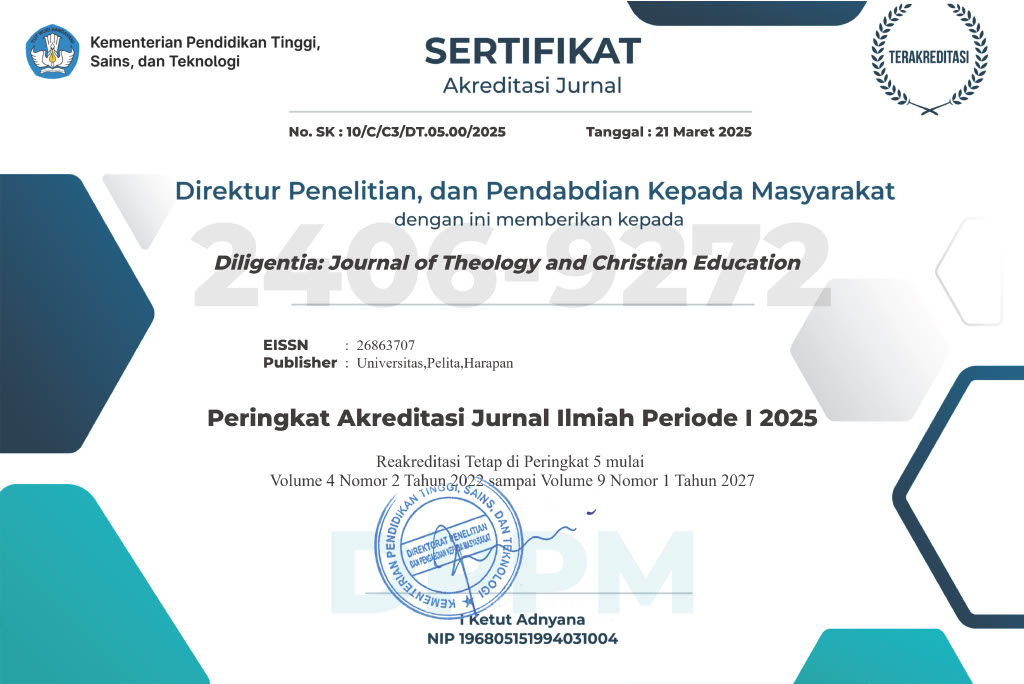Dampak Natur Manusia Berdosa melalui Munculnya Keterbuaian pada Aspek Penggunaan Bahasa [The Impact of Man's Sinful Nature in The Use of Language]
DOI:
https://doi.org/10.19166/dil.v2i1.2085Keywords:
Impact, Man's Sinful Nature, XenoglosofiliaAbstract
The objective of this study is to understand the impact of man’s sinful nature as an inborn trait in humanity. The sinful nature of man becomes more complex in every aspect of his life. The method used in this research is literature study which seeks to analyze relevant bibliographies on several forms of human infatuation as the result of man’s sinful nature. From this study, it can be concluded that there are several forms of sinful human infatuation i.e. infatuation in the aspect of religion and God, in the aspect of technology and culture, and in the aspect of language and its application. But the emphasis here is on the infatuation in the aspect of language usage in the Indonesian context. One reason for this is that most people in our society tends to have greater love and pride in foreign languages. Such attitude in linguistics is known as xenoglosofilia. The impact of this infatuation on foreign languages is a lack of respect for one’s own native language, viewing it as less prestigious compared to other languages.
References
Badan Pengembangan Bahasa dan Perbukuan. KBBI Daring. Diunduh dari https://kbbi.kem dikbud.go.id/entri/terbuai pada tanggal 8 Januari 2020.
Badan Pengembangan dan Pembinaan Bahasa. “Lokakarya Penggunaan Bahasa Indonesia Media Dalam Ruang di Kabupaten Tabanan.” Diunduh dari https://badanbahasa.kem dikbud. go.id/lamanbahasa/berita/2693/lokakarya-penggunaan bahasa-indonesia-media-dalam-ruang-di-kabupaten-tabanan pada tanggal 28 Oktober 2019
Bahasa Esperanto. Diunduh dari https://wikipedia.org/wiki/Bahasa_Esperanto pada tanggal 25 Oktober 2019.
Endarmoko, Eko. Remah-Remah Bahasa: Perbincangan dari Luar Pagar. Yogyakarta, Indonesia: PT Bentang Pustaka, 2017.
Harahap, Tamam Ruji. 2010. “Bahasa Menunjukkan Bangsa Studi Kasus Xenoglosofilia dalam Daftar Menu.” Diunduh dari Tanggal https:// www.widyaparwa.com/index.php /widya parwa/article/view/8 pada tanggal 8 Januari 2020.
Haryanti, Putri dkk. “Mitigasi Gejala Xenoglosofilia melalui Penataan Bahasa Negara di Ruang Publik.” Diunduh dari http://badanbahasa. kemdikbud.go.id/ lamanbahasa/sites /default/files/prosiding/Seminar%2Internasional%20Kebahasaan%202019/Makalah%20Kebinekaan/82%20Makalah%2Kebinekaan%20-%20PUTRI%HARYANTI.pdf pada tanggal 8 Januari 2020.
Hardiman, Frangky Budi. “Heidegger di Zaman Telepon Genggam.” Dalam Basis Nomor 07-08.Yogyakarta, 2018.
Harun, Martin. “Alkitab: Sumber Teologi Lingkungan Hidup.” Jakarta, Indonesia: Seksama Penerbit Katolik Indonesia, 2013.
Kementerian Sekretarian Negara. “Salinan Perpres No 63 tentang Penggunaan Bahasa Indonesia.” Diunduh dari https:// jdih.setkab.go.id/PUUdoc/175936/Perpres_Nomor_63 _ Tahun_2019.pdf pada tanggal 29 Oktober 2019.
Kridalaksana, Harimurti. Kamus Linguistik Edisi Keempat. Jakarta, Indonesia: PT Gramedia Pustaka Utama, 2008.
Lanin, Ivan. Xenoglosofilia: Kenapa Harus Nginggris?. Jakarta, Indonesia: PT Kompas Media Nusantara, 2018.
Lapasau, Merry dan E. Zainal Arifin. Sosiolinguistik. Tangerang, Indonesia: PT Pustaka Mandiri, 2016.
Lembaga Alkitab Indonesia. Alkitab. Jakarta, Indonesia: Lembaga Alkitab Indonesia, 2010.
Sternberg, R J, K Sternberg, and J S Mio. Cognition, International Edition. Boston, MA: Cengage Learning, 2012.
Undang-Undang Nomor 24 Tahun 2009 tentang “Bendera, Bahasa, dan Lambang Negara, serta Lagu Kebangsaan. Diunduh dari http://badanbahasa.kemdikbud.go.id/lamanbaha sa/sites/default/files/UU_2009_24.pdf pada tanggal 8 Januari 2020.Downloads
Published
How to Cite
Issue
Section
License
Authors who publish with this journal agree to the following terms:
1) Authors retain copyright and grant the journal right of first publication with the work simultaneously licensed under a Creative Commons Attribution License (CC-BY-SA 4.0) that allows others to share the work with an acknowledgement of the work's authorship and initial publication in this journal.
2) Authors are able to enter into separate, additional contractual arrangements for the non-exclusive distribution of the journal's published version of the work (e.g., post it to an institutional repository or publish it in a book), with an acknowledgement of its initial publication in this journal.
3) Authors are permitted and encouraged to post their work online (e.g., in institutional repositories or on their website). The final published PDF should be used and bibliographic details that credit the publication in this journal should be included














